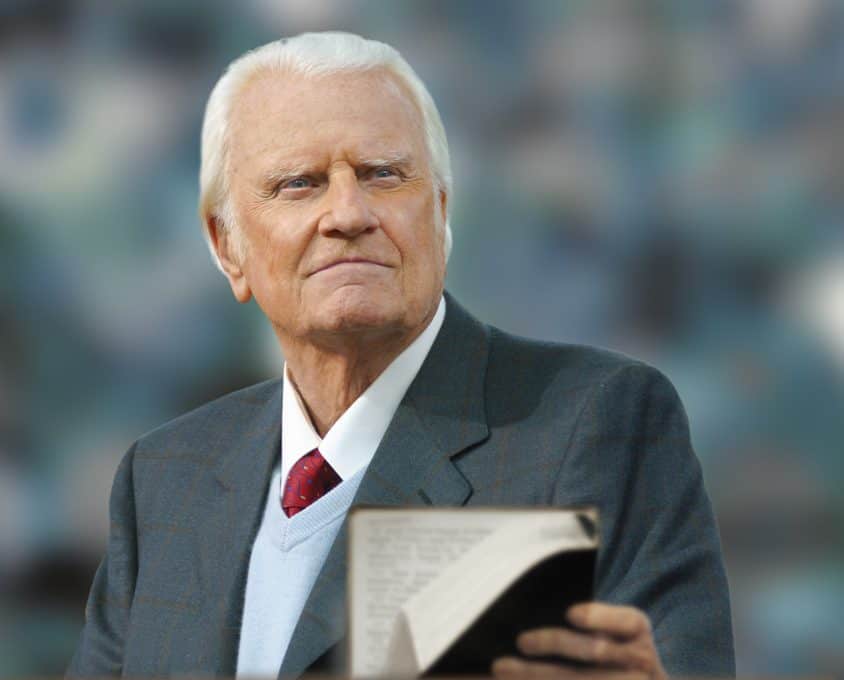ST. JOSEPH – Veronica Thomas came to faith on June 11, 1953, through the witness of Billy Graham. But she didn’t hear his evangelistic preaching at one of Graham’s famous evangelistic crusades. Rather, she came to faith while watching one of his first technicolor films at a St. Joseph movie theater.
“Movies were black and white most of the time, and this was a technicolor film,” said Thomas, now a member of Saginaw Baptist Church in Saginaw. Churches in St. Joseph came together to present the film, and Thomas walked two miles to see it.
The film was “Oiltown, USA,” produced in 1953 by World Wide Pictures — a studio that Graham founded two years earlier to make full-length films with spiritual messages. “Oiltown, USA” told the story of the fictional oil tycoon Les Manning, whose world crumbled after his daughter discovered his corrupt business dealings. As a result, Manning confesses his sin and admits his need for a savior after hearing an evangelistic message by Billy Graham on television. The film ends with the song, “Lord, I’m coming home”: “Coming home, coming home, / Nevermore to roam. / Open wide Thine arms of love. / Lord, I’m coming home.”
As she watched the film and heard Graham’s declaration of the gospel, Thomas recognized her own need for a savior. So when a local minister gave an invitation following the movie, she was quick to respond.
“I couldn’t resist,” Thomas said. “I had to go forward and accept Christ. They sang, ‘Lord, I’m coming home,’ and I needed a home to come to. And I just knew that Christ is the answer.”
After hearing about Graham’s own heavenly homegoing at the age of 99 on Feb. 21, Thomas thanked God for how he impacted her own life.
“Praise the Lord! He’s meeting Jesus,” she said. And she is not alone among Missouri Baptists in praising God for the lives changed through Graham’s evangelistic ministry.
John Yeats, executive director of the Missouri Baptist Convention, praised Graham’s steadfast faithfulness to the gospel.
“In the Old Testament, Elisha was the spiritual/political icon for a nation, even one that was ruled by a morally corrupt king,” he said. “Over the course of our nation’s history, there is no one like Dr. Billy Graham. For three-fourths of a century, people in every station of life heard and were drawn to Jesus because of his faithfulness to the gospel of Jesus Christ. Rulers and administrations sought Dr. Graham’s counsel for what is right, and only the most foolish rejected the truth he spoke. This giant of faith leaves a legacy that is unprecedented. Can you imagine the celebration in heaven when he stepped across the threshold from this life into heaven? There are millions in heaven today because of Dr. Graham’s giftedness and faithfulness to the gospel of Jesus Christ. We join with millions still on the earth in praying for his family.”
For more than 60 years, Graham was known for his evangelistic tent and stadium crusades. It’s estimated he personally preached a simple gospel of Christ alone to more than 210 million people. He accepted Christ at the age of 16, and after being ordained as a Southern Baptist minister in 1939 began preaching with a southern drawl and fiery style that were his signature.
Graham was also a friend, confidant and adviser to several U.S. Presidents, including Harry Truman, Lyndon Johnson, Richard Nixon, George W. Bush and Barack Obama. He was so well liked and respected that many called him “America’s Pastor.”
Ken Parker, pastor of First Baptist, Kearney and president of the Missouri Baptist Convention, said there are few people who have been touched by Graham’s ministry.
“He was a once-in-a-lifetime influencer,” he said. “Even more than his preaching and writing, his commitment to maintaining his integrity as a Christian leader is what influenced me most. He lived and now has died without giving the world a reason to point and say, ‘See, I told you so.’ That’s an example I want to emulate ’til I die.”
Steve Strauch, director of missions for Laclede Baptist Association, attended a 1999 Billy Graham crusade in St. Louis, and remembers his message as “the gospel in its purest.”
“I was a young pastor and knew this was my chance to see him,” he said. “Even then, it was rumored to possibly be one of his last crusades. We chartered a bus and took about 30 from the community. I remember just realizing, ‘That’s him.’ The crowds were fixed on him. I always noticed how his presentation was simple, but the message was the power.”
Miles Mullin, Vice President for Academic Administration and professor of religious history at Hannibal-LaGrange University called Graham a “winsome and gifted communicator.”
“He leaves behind a multitude of effective ministries, but most importantly, he leaves behind millions of people who responded to his appeal that they must be born again,” said Mullin, whose expertise is in the history of 20th-century evangelicalism. “His leadership in mid-to-late twentieth century is well-attested as he helped bring together previously disparate groups who agreed with his message under the larger rubric of evangelicalism. Out of that movement and as a result of his leadership, a whole host of cooperative evangelical enterprises ministries such as Christianity Today, Gordon-Conwell Seminary, and the Billy Graham Evangelistic Association, emerged that have shaped American evangelicalism, even into the twenty-first century.”

